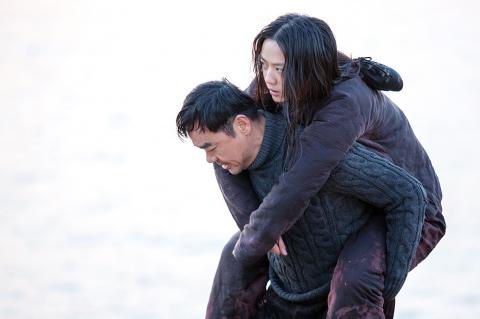Throughout their three-decade collaboration, writer-director duo Mabel Cheung (張婉婷) and Alex Law (羅啟銳) have earned a reputation for making intimate dramas — An Autumn’s Tale (秋天的童話, 1987) and Echoes of the Rainbow (歲月神偷, 2010) — about people who are geographically or psychologically dislocated.
A Tale of Three Cities (三城記), starring arthouse favorites Sean Lau (劉青雲) and Tang Wei (湯唯), is the kind of movie one has high expectations of. It tells a romanticized real-life story of the parents of martial-arts hero Jackie Chan (成龍). Unfortunately, the film lacks the ambition and execution it needs to carry this off. As the period drama unfolds, genuine human emotion and empathy are left out, making the story more affected than affecting.
Set in the war-torn China of the 1930s and 1940s, the film looks to a time when death and survival were the order of the day. It opens in 1950s Hong Kong, where Daolong (Chan’s future father), played by Lau, works as a cook in the American embassy. Flashbacks return viewers to the Sino-Japanese War and Chinese Civil War, a time when the younger Daolong is a customs officer with two sons. Yuerong (Chan’s future mother), played by Tang, is a strong-willed mother of two daughters, forced into illegal activity to support her family.

Photo courtesy of Hualien Media
Fate brings Daolong and Yuerong together and they become lovers, their spouses already having passed away. But their romance is ill-fated. The couple, uprooted by war, travel to Shanghai and eventually Hong Kong. They are separated and reunited again and again, and that is what mostly happens throughout the story. While exceeding two hours in length, the film at times feels like a repetitive and protracted courtship, revolving around the two lovers kissing and embracing after separations across different historical events.
The story moves rather hastily from location to location, trying to cover a lot of ground, but leaving little time for motive and character development. While the film’s top-notch cast hand in good performances, even China’s fine thespian Qin Hailu (秦海璐) and Hong Kong’s Kam Yin-Ling (金燕玲) cannot rescue their characters from being flat and insipid. It is certainly not one of Lau and Wei’s best work.
In A Tale of Three Cities, Cheung and Law tumble under the weight of history, delivering a lackluster and vacant historical piece, rather than a touching human story.

“Why does Taiwan identity decline?”a group of researchers lead by University of Nevada political scientist Austin Wang (王宏恩) asked in a recent paper. After all, it is not difficult to explain the rise in Taiwanese identity after the early 1990s. But no model predicted its decline during the 2016-2018 period, they say. After testing various alternative explanations, Wang et al argue that the fall-off in Taiwanese identity during that period is related to voter hedging based on the performance of the Democratic Progressive Party (DPP). Since the DPP is perceived as the guardian of Taiwan identity, when it performs well,

The Taiwan People’s Party (TPP) on May 18 held a rally in Taichung to mark the anniversary of President William Lai’s (賴清德) inauguration on May 20. The title of the rally could be loosely translated to “May 18 recall fraudulent goods” (518退貨ㄌㄨㄚˋ!). Unlike in English, where the terms are the same, “recall” (退貨) in this context refers to product recalls due to damaged, defective or fraudulent merchandise, not the political recalls (罷免) currently dominating the headlines. I attended the rally to determine if the impression was correct that the TPP under party Chairman Huang Kuo-Chang (黃國昌) had little of a

At Computex 2025, Nvidia CEO Jensen Huang (黃仁勳) urged the government to subsidize AI. “All schools in Taiwan must integrate AI into their curricula,” he declared. A few months earlier, he said, “If I were a student today, I’d immediately start using tools like ChatGPT, Gemini Pro and Grok to learn, write and accelerate my thinking.” Huang sees the AI-bullet train leaving the station. And as one of its drivers, he’s worried about youth not getting on board — bad for their careers, and bad for his workforce. As a semiconductor supply-chain powerhouse and AI hub wannabe, Taiwan is seeing

Jade Mountain (玉山) — Taiwan’s highest peak — is the ultimate goal for those attempting a through-hike of the Mountains to Sea National Greenway (山海圳國家綠道), and that’s precisely where we’re headed in this final installment of a quartet of articles covering the Greenway. Picking up the trail at the Tsou tribal villages of Dabang and Tefuye, it’s worth stocking up on provisions before setting off, since — aside from the scant offerings available on the mountain’s Dongpu Lodge (東埔山莊) and Paiyun Lodge’s (排雲山莊) meal service — there’s nowhere to get food from here on out. TEFUYE HISTORIC TRAIL The journey recommences with